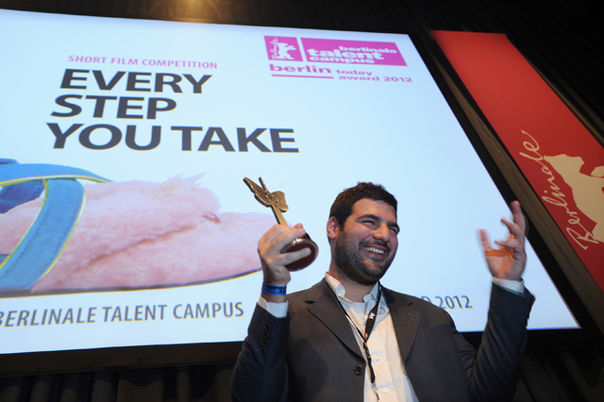Young Superheroes
With his short film BATMAN AT THE CHECKPOINT, Rafael Balulu is the winner of the 2012 Berlin Today Award.

Rafael Balulu receives the Berlin Today Award
BATMAN AT THE CHECKPOINT, by Rafael Balulu, won the Berlin Today Award last Sunday. The BTA is a program for former and current Berlinale Talent Campus participants, through which five fledgling directors get a chance to cooperate with a Berlin or Brandenburg production company and premiere their films during the Campus itself.
The twelve-minute long BATMAN is polished and incredibly precise. It states its goals clearly, perhaps exceedingly so, to the point of coming across as a bit schematic. Its characters hold specific symbolic resonance and hardly breathe outside their functionality within the theme, while its narrative riches are exhausted once the political point is made. But it is undeniably successful at telling its story.
The film opens with chaos, a long chains of cars stuck at a traffic jam at a checkpoint outside Jerusalem. From the lowered windows of all the vehicles flows an aural tapestry of delicious complexity. We hear radio music, indistinct insults, and fragmented conversations. As the camera pans from right to left, each frustrated carpool unit represents a possible story. So there is a misleading sense of arbitrariness when the camera finally finds its subjects: two boys – one Palestinian, the other Israeli – trapped with their parents in separate cars.
But, of course, there is nothing actually aleatory about this choice of protagonists. Both families represent their respective nations, while the arguments that erupt between them are microcosmic echoes of larger conflicts. A traffic accident makes both sets of parents collide in a stream of bickering, while their boys stage their own dispute, fighting over a doll-sized Batman and running amidst the motionless automobiles languishing on the sun-drenched road.
Although they appear to mimic the adults, the boys are free of prejudice. Their fight is primarily playful, and although their game ends in violence, the result is nothing more than a temporary wrestle over a toy. Later, they return to the innocent whim of making funny faces at each other, their noses flat against the passenger windows of their cars. Without meaning to, they savagely satirise their parents, reducing their incoherent debate about the traffic accident – and, by extension, about the situation between their nations – to the level of a kindergarten playground brawl.
The grown-ups never raise a fist, but the unspoken tension between them is far more violent than the tumble their kids have on the asphalt. And there is an even more pernicious violence at work, the institutional violence that damages the texture of human relations. As the Israelis drive on home, the Palestinians are detained at the checkpoint. Still absorbed in their duel of funny faces, the boys share a final glance before parting, unaware of the meaning behind what separates them.


301 Moved Permanently